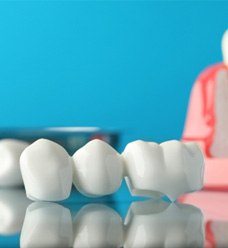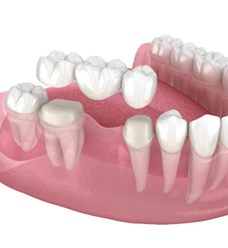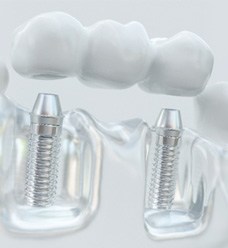
Are missing teeth affecting your quality of life? Regain confidence in your smile with a dental bridge from Jacksonville Dental Specialists in Jacksonville, FL. Our expert team specializes in crafting flawless tooth replacements that seamlessly fill the gap left by one or more consecutive missing teeth. With customized treatment plans and personable dental specialists, we ensure highly aesthetic and lasting results tailored to your unique needs.

A dental bridge is a fixed dental restoration used to replace one or more missing teeth by bridging the gap between adjacent teeth.
Before you receive any type of tooth replacement, it’s important to have a consultation with Dr. Aguila or Dr. Nawrocki to determine the most suitable type of bridge for your needs. Our practice offers two distinct dental bridge types and both have different advantages.

Traditional dental bridges consist of pontics (prosthetic teeth) supported by dental crowns attached to adjacent natural teeth. This type of bridge restores aesthetics, chewing function, and prevents adjacent teeth from shifting due to tooth loss. A traditional bridge can be fixed or removable based on your preferences and situation.

Implant bridges are anchored by dental implants surgically placed in the jawbone. This eliminates the need to alter the adjacent teeth. Our implant bridges provide great stability and durability. As an added bonus, they also keep your jawbone strong and healthy through their titanium root replacement.

If left alone, gaps in your teeth can quickly cause more issues like bite misalignment, trouble eating your favorite foods, and decreased confidence in social situations. Choosing dental bridges from Jacksonville Dental Specialists offers numerous benefits, including:
Ready to restore your smile with flawless tooth replacement with Dr. Aguila and Dr. Nawrocki? Contact Jacksonville Dental Specialists today to schedule a consultation. There’s only one way to discover the transformative benefits of a dental bridge, and that’s by getting one.
How long your dental bridge will generally last varies greatly depending on a few factors. That said, you can usually expect your restoration to last anywhere from five to fifteen years. Metal bridges compromise a lot in aesthetics, but they also tend to last longer than their ceramic equivalents.
You can also extend the lifespan of your dental bridges via thorough hygiene. If you make a habit of brushing twice a day, flossing daily, and seeing us often for regular preventive appointments you can expect your dental bridge to stick around for quite a while.
Partial dentures are sometimes called “removable bridges,” though this is a little bit of a misnomer. There are all kinds of significant differences between the two:
As you can imagine, any new feature in your mouth will seem a little bit unusual at first. That said, dental bridges are made from durable, realistic materials. They’ll be meticulously sculpted to fit your mouth, and will be designed to fit easily over the teeth. These things being the case, you should expect your dental bridges to feel completely natural once you’re used to them.
There will be a small gap between your dental bridge and the gums, and it will be necessary to clean under it if you want to keep gum disease at bay. There are a variety of methods to do this, affording you plenty of options to pick one.
First there are floss threaders, which can make it easier to get a piece of dental floss in between the bridge and the gums. You might also be interested in an interdental brush, which is a little bit like a small plastic toothpick. Finally, if you’re willing to make a larger up-front investment, you might want to buy an oral irrigator; these use pressurized water to blast away bacteria and food particles.